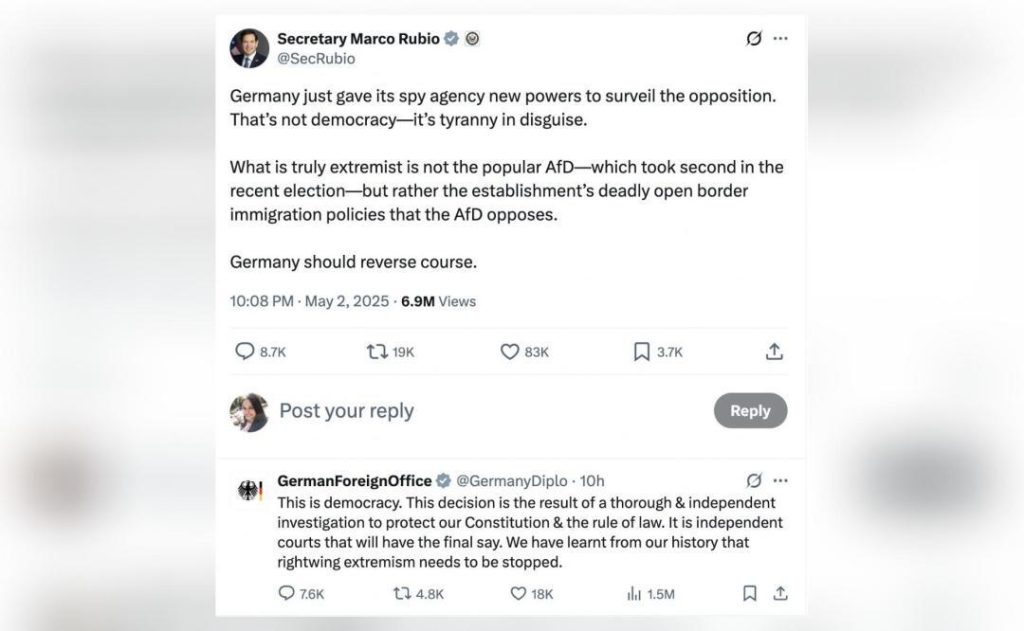
US Secretary of State Marco Rubio and German Foreign Ministry clashed on the issue of the far-right Alternative for Germany (AfD) party being labelled as “extremist” by Germany’s spy agency, with Rubio accusing Germany of enabling “tyranny in disguise”.
The controversy erupted after Germany’s Federal Office for the Protection of the Constitution (BfV) designated the AfD party as “extremist” due to its anti-immigrant and anti-Islam rhetoric. The BfV’s decision was based on a thorough investigation aimed at protecting the German Constitution.
However, Rubio took to social media to express his disagreement with the German government’s stance, stating that the AfD party’s “extremist” label was a result of their own “politically-motivated” agenda. Rubio claimed that the German government’s decision was an attempt to silence critics of immigration and Islam.
“The decision to label the AfD as ‘extremist’ is a result of a thorough investigation to protect our Constitution,” the German government replied to Rubio’s remarks. The German government’s statement emphasized the BfV’s independence and the importance of protecting the Constitution.
The clash between Rubio and the German Foreign Ministry is the latest in a series of diplomatic disputes between the US and Germany over issues such as trade, climate change, and security. The US and Germany have traditionally enjoyed strong diplomatic ties, but recent tensions have highlighted the challenges of navigating complex global issues.
The AfD party, which was founded in 2013, has gained popularity in Germany by tapping into anti-immigrant and anti-Islam sentiments. The party’s leaders have made controversial statements about Muslim immigrants and have been accused of spreading hate speech.
The BfV’s decision to label the AfD as “extremist” is seen as a significant step in Germany’s efforts to combat right-wing extremism. The move has sparked concerns among some AfD supporters that the party will be banned or restricted, while others have praised the decision as a necessary step to protect democratic values.
Rubio’s criticism of the German government’s stance has been met with strong condemnation from some quarters. The German government has been accused of being overly cautious in its approach to addressing right-wing extremism, with some critics arguing that the AfD party’s rhetoric is a threat to democratic values.
The clash between Rubio and the German Foreign Ministry highlights the challenges of navigating complex global issues. The US and Germany have traditionally enjoyed strong diplomatic ties, but recent tensions have highlighted the importance of open communication and mutual understanding.
The controversy surrounding the AfD party’s “extremist” label also raises questions about the limits of free speech and the role of governments in combating hate speech. The debate is complex and nuanced, with some arguing that governments should take a more proactive role in combating hate speech, while others argue that restrictions on free speech can have unintended consequences.
In conclusion, the clash between US Secretary of State Marco Rubio and the German Foreign Ministry over the AfD party’s “extremist” label highlights the challenges of navigating complex global issues. The controversy also raises important questions about the limits of free speech and the role of governments in combating hate speech. As the world grapples with the challenges of right-wing extremism, it is essential that governments and civil society work together to promote democratic values and protect human rights.



